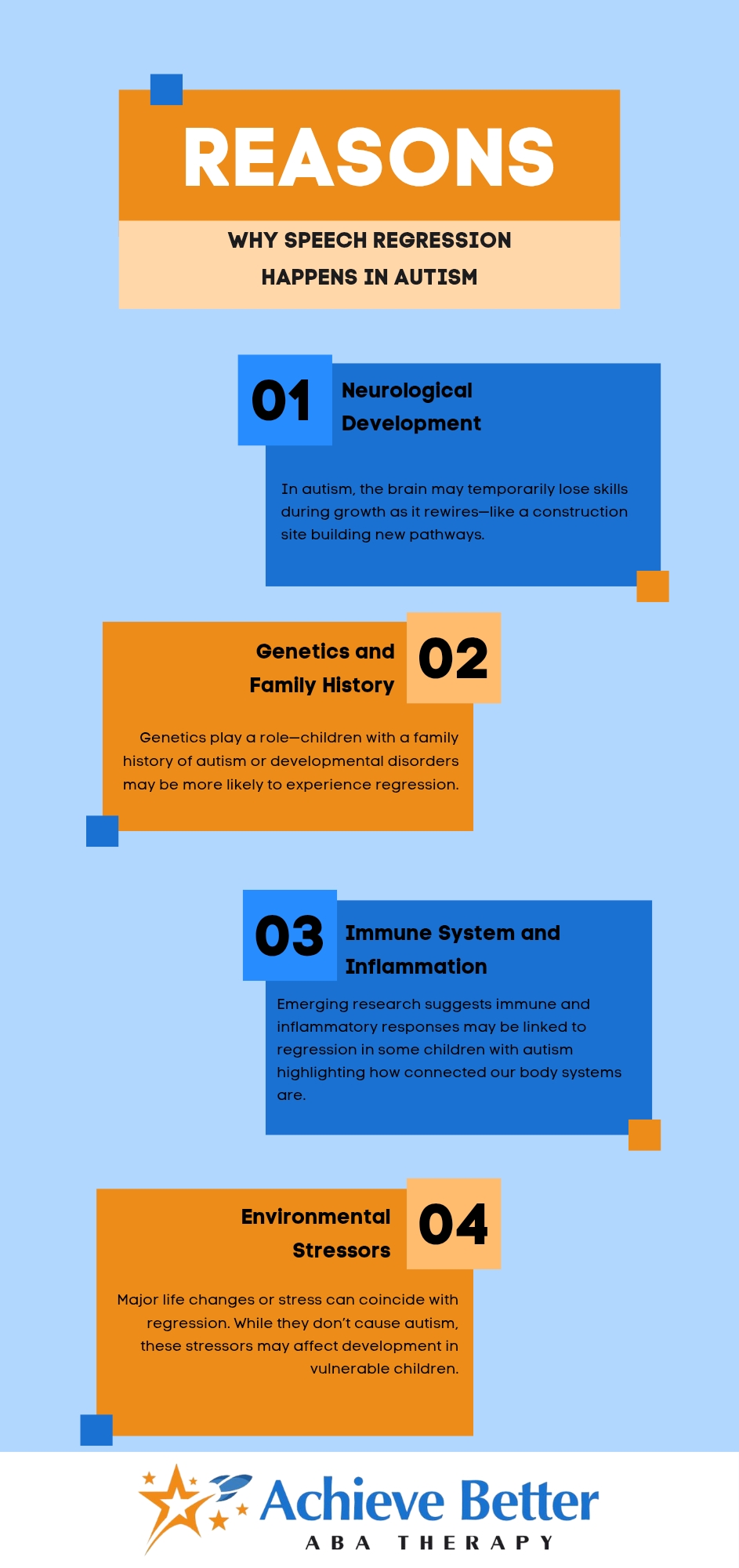Language and Speech Regression in Autism: Causes and Support

Key Points:
- Language and speech regression is a distressing yet common phenomenon in early autism development.
- Multiple factors, including neurological changes, genetics, and environmental stressors, may contribute to speech regression.
- Early intervention strategies like speech therapy and ABA therapy offer strong support and promising outcomes.
Sometimes, a child who once joyfully said “Mama” or sang along to lullabies suddenly stops speaking. As a parent, this can feel like the world shifting beneath your feet. You're not alone. Many parents of autistic children experience this confusing and emotional journey—known as autism speech regression, a form of speech and language loss that can be especially alarming.
Is Speech Regression a Common Feature of Autism?
Yes, speech and language regression can be a hallmark of autism in some children, especially during toddler years. While not every autistic child experiences regression, it is a well-documented phenomenon that tends to appear between 15 to 30 months of age.
In autism, speech regression refers to the loss of previously acquired language skills, such as words, phrases, babbling, or gestures. A child may suddenly stop talking, lose eye contact, or withdraw socially. It can be subtle or rapid, leaving parents deeply concerned.
Understanding autism speech regression is essential not only for early diagnosis but also for getting the right help at the right time. Let's unpack what causes it, what it looks like, and how you can best support your child.
What Does Speech Regression Look Like?
Speech regression isn’t always easy to spot, especially if a child is still quite young or their development was slightly delayed from the start. But most parents notice something is “off.” Some signs to watch for include:
- A child who used to say several words now says none.
- Reduced babbling or vocal play.
- Less interest in social interaction, including smiling or pointing.
- Decreased eye contact or joint attention.
- Withdrawal from familiar routines or games.
Parents often describe this as a kind of “disconnect.” A once expressive and interactive child might now seem distant, confused, or unusually quiet.
Why Does Speech Regression Happen in Autism?
The exact cause of autism speech regression is still being studied, but researchers and clinicians have proposed several possibilities. It’s likely that a combination of neurological, genetic, and environmental factors plays a role:

How Can Parents Support a Child Who is Regressing?
The good news is, early intervention can make a world of difference. The earlier support begins, the better the chances of helping a child regain and build communication skills. Here are some strategies and tools that parents have found helpful:
1. Seek a Developmental Evaluation
If your child is showing signs of regression, consult a pediatrician or developmental specialist. An official diagnosis can open the doors to the support systems your child may need.
2. Begin Speech and Language Therapy
Speech-language pathologists are trained to work with children experiencing delays or regressions. Therapy may involve:
- Teaching alternative communication strategies, like sign language or picture boards.
- Practicing foundational communication skills, such as imitation or taking turns.
- Encouraging any vocalization or social interaction, even if it's nonverbal.
3. Consider ABA Therapy
Applied Behavior Analysis (ABA) is one of the most evidence-based approaches for children with autism, including those experiencing regression. ABA therapy breaks down communication into manageable steps and reinforces positive behavior through structured techniques.
4. Use Augmentative and Alternative Communication (AAC)
For some children, technology-assisted communication—like speech-generating devices—can help bridge the gap while they work on regaining verbal skills.
5. Be Consistent and Patient
Children who regress need extra reassurance and predictability. Creating a calm, routine-driven environment can reduce anxiety and provide a secure space for growth.
What Role Does Emotional Support Play?
Witnessing regression can be heartbreaking. As a parent, it’s natural to feel grief, fear, and helplessness. But your emotional stability and advocacy are among the most powerful tools you bring to the table.
Find your community—online or local support groups, therapists, or fellow parents who understand this journey. Self-care isn’t selfish. It’s necessary. Helping your child means taking care of your own emotional needs too.
Is Language Lost Forever?
Thankfully, no. Many children who experience autism speech regression do regain language, especially with early, targeted intervention. Progress may not be linear, and it may not always follow typical timelines, but growth is absolutely possible.
Some children go on to speak fluently. Others communicate with a mix of spoken words and assistive tools. What’s important is building a communication system that works for your child—on their own terms.
How Does ABA Therapy Help Children with Speech Regression?
ABA therapy focuses on understanding behavior and teaching skills through positive reinforcement. For children with autism speech regression, ABA can:
- Reinforce attempts at communication (verbal or nonverbal).
- Break down language into small, teachable units.
- Identify and reduce behaviors that interfere with speech (like avoidance or anxiety).
- Build social and play skills that naturally promote communication.
Progress in ABA is individualized. Each plan is tailored to your child’s unique needs and learning style, which is especially important in cases of regression where every moment counts.
Ready to Support Your Child? ABA Therapy in North Carolina Can Help
At Achieve Better ABA, we understand how deeply concerning speech regression can be. Our compassionate, professional team specializes in ABA therapy in North Carolina, working one-on-one with children to rebuild lost skills and foster meaningful communication.
We don’t offer a one-size-fits-all approach—because every child deserves a plan that meets them where they are. Through structured support, evidence-based techniques, and genuine care, we help children move forward at their own pace—with you right by their side.
If your child is showing signs of autism speech regression, don’t wait. Reach out to us today and begin a journey toward reconnection, expression, and hope.
Similar articles
Contact us today to learn more.




.jpg)

.jpg)





